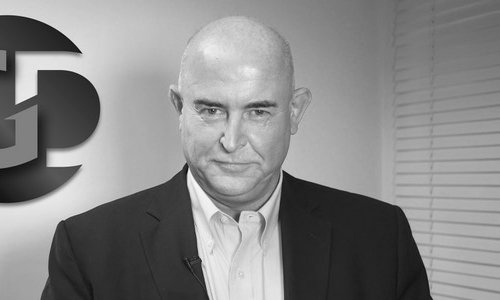If you want (or need) to be a great public speaker, if you want to enthral your audience and be remembered, then don’t miss this episode of Curious Leadership. Because Graham Davies, the self-titled reformed barrister turned accidental orator, is not just a captivating public speaker. Graham is also a renowned public speaking coach whose list of blue-chip corporate and individual high-profile clients reads like an international Who’s Who and includes 8 FTSE 100 CEOs and 20 Cabinet Ministers across successive governments.
Graham started life as a barrister, practising law for 12 years, but found a new calling in the late 80s and early 90s when he discovered that there was a budding marketplace for professional after dinner speakers and there was good money to be made doing it.
Leveraging his identity as a barrister by day and public entertainer by night, he eventually found himself giving 100 after-dinner speeches a year, whilst maintaining his day job working as a barrister 9 days out of 10, and something had to give.
It wasn’t a hard choice to make – he not only enjoyed public speaking more than law, but it paid better too.
Ever the consummate professional, Graham began turning up to his speaking engagements earlier and earlier, listening to the speakers who preceded him, and he realised that public speaking was not, as is commonly thought, an innate skill that we all have.
And so began his second and current career as The Presentation Coach.
Listen to this fantastic high energy, high octane discussion with Graham. We’re sure you’ll enjoy it.
On today’s podcast:
- How he became The Presentation Coach
- What he looks for in clients who need his help
- His process for teaching the art of public speaking
- Why you want to make people feel, rather than listen
- The power of persuasive speech
- How TED talks have turned public speaking into rock and roll
- The benefit of ruthless preparation
- Developing your micro message
Links:
- Graham’s book – The Presentation Coach
Learn to Speak Publicly with The Presentation Coach
If you’re required to speak publicly, how do you know if you need coaching in it or not? Isn’t speaking about as natural a skill as they come?
Well, as it turns out, no. Speaking yes, public speaking, no.
Which is why this week’s guest, Graham Davies, has built an incredibly successful career teaching the art of public speaking to a litany of clients ranging from CEOs of FTSE 100 companies to politicians and celebrities.
So what are the symptoms of a public speaker who needs to hone their craft?
According to Graham you’re easy to spot.
The symptoms of a poor public speaker
“Often they’re addicted to an almost narcotic substance, which I would call PowerPoint Prozac or Visual Valium. Essentially, they’re creating a slideshow for which they are the softly spoken voiceover.”
So if you find yourself having less of an impact than you hoped and when you dare look up from your notes you find you’ve had a narcoleptic effect on your audience, now might be the time to call in the experts.
It’s also worth considering outside assistance if:
- Slides dominate your life
- You don’t have a technique to create the words, you just talk under pressure
- You present to your laptop rather than the audience
- You create multiple slides jam-packed with bullet points, to which you then talk
“I don’t think anybody has ever walked out of a conference and thought, ‘Gosh, I wish there were more speakers. I wish each speaker had spoken for longer. And I wish each speaker had used more slides with more bullet points. And with a smaller font’… I think that slides do have their place, but they should be used sparingly like caviar, and not spread around like marmalade.”
So what advice does Graham have for those in need of public speaking tutoring?
The Presentation Coach Process
“My technique gives them a process whereby they can prepare their spoken material with laser beam precision and advance rather than waiting for inspiration, staring at the audience, who are staring back at them in judgmental silence.”
And that process?
“The way I look at it is that speaking just consists of two phases. Phase number one, deciding what to say. Phase number two saying it. It really is as simple as that.”
If only life were that simple.
Graham, in fact, provides his clients with a much more in-depth sequence of events that they need to follow, with these two points setting them on their way:
- First, you have to analyse your audience and work out what sort of people they are, their age ranges, their areas of expertise, sometimes their job title.
- Then figure out the answers to these questions:
- Why are they together in that room?
- What do they want to hear?
- What do they need to hear?
- What must you give them during your presentation?
The final question is the crucial one because that is the question that guarantees that you get what you want from giving the presentation.
Once you’ve answered these questions, according to Graham, you’re in a position to know where your audience is before you begin – what they know, think or feel about your subject, so you aren’t teaching them to suck eggs.
Why you want to make people feel, rather than listen
So what do you care what people feel about your subject, or what you’re going to say about it?
Graham says, “when it comes to the spoken word, people often forget what you’ve made them think. But if you get the words right, they will never forget what you make them feel.”

